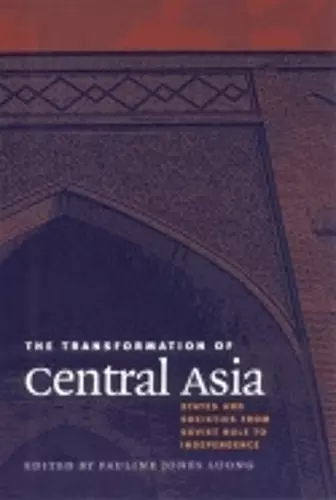The Transformation of Central Asia
States and Societies from Soviet Rule to Independence
Format:Hardback
Publisher:Cornell University Press
Published:10th Nov '03
Currently unavailable, and unfortunately no date known when it will be back
This hardback is available in another edition too:
- Paperback£31.00(9780801488429)

With the fall of the Soviet Union in 1991, former Communist Party leaders in Central Asia were faced with the daunting task of building states where they previously had not existed: Kazakhstan, Kyrgyzstan, Tajikistan, Turkmenistan, and Uzbekistan. Their task was complicated by the institutional and ideological legacy of the Soviet system as well as by a more actively engaged international community. These nascent states inherited a set of institutions that included bloated bureaucracies, centralized economic planning, and patronage networks. Some of these institutions survived, others have mutated, and new institutions have been created.
Experts on Central Asia here examine the emerging relationship between state actors and social forces in the region. Through the prism of local institutions, the authors reassess both our understanding of Central Asia and of the state-building process more broadly. They scrutinize a wide array of institutional actors, ranging from regional governments and neighborhood committees to transnational and non-governmental organizations. With original empirical research and theoretical insight, the volume's contributors illuminate an obscure but resource-rich and strategically significant region.
During the long period of communist control of Central Asia, this region was treated largely as a peripheral part of the Soviet Union. Consequently, despite its rich culture and historical achievements, the region received scant scholarly attention in the West. The downfall of the Soviet Union and the subsequent independence of the former Soviet republics elevated Central Asia from obscurity in the West, and the region has been catapulted... into the forefront of the 'war against terrorism.'... All chapters of this book are well informed and create a united whole.... Highly recommended. Upper-division undergraduates and above.
* Choice *Luong and her colleagues challenge basic assumptions said to have guided earlier studies of Central Asia: that the Soviet system only superficially penetrated traditional cultural norms and organizations, that Islam was a force waiting to be unleashed, and that the Central Asian republics were more colonies than an integral part of the Soviet Union. In a series of detailed essays examining the situation of women, the role of nongovernmental organizations, center-regional relations, and the place of culture and language, the contributors contend that the Soviet legacy looms large, regional divisions rather than clans or tribes define the political arena, leaders exploit rather than subscribe to pre-Soviet traditions, and Islam is tamed and localized.
-- Robert Levgold * Foreign AffaiISBN: 9780801441516
Dimensions: 235mm x 155mm x 27mm
Weight: 907g
352 pages